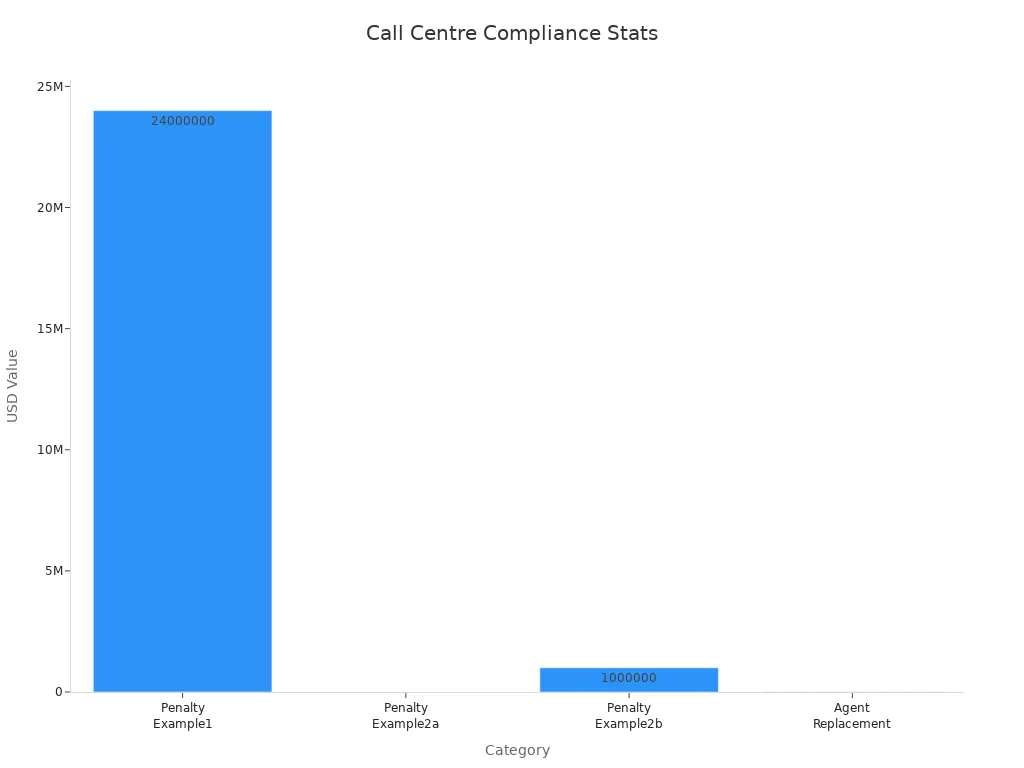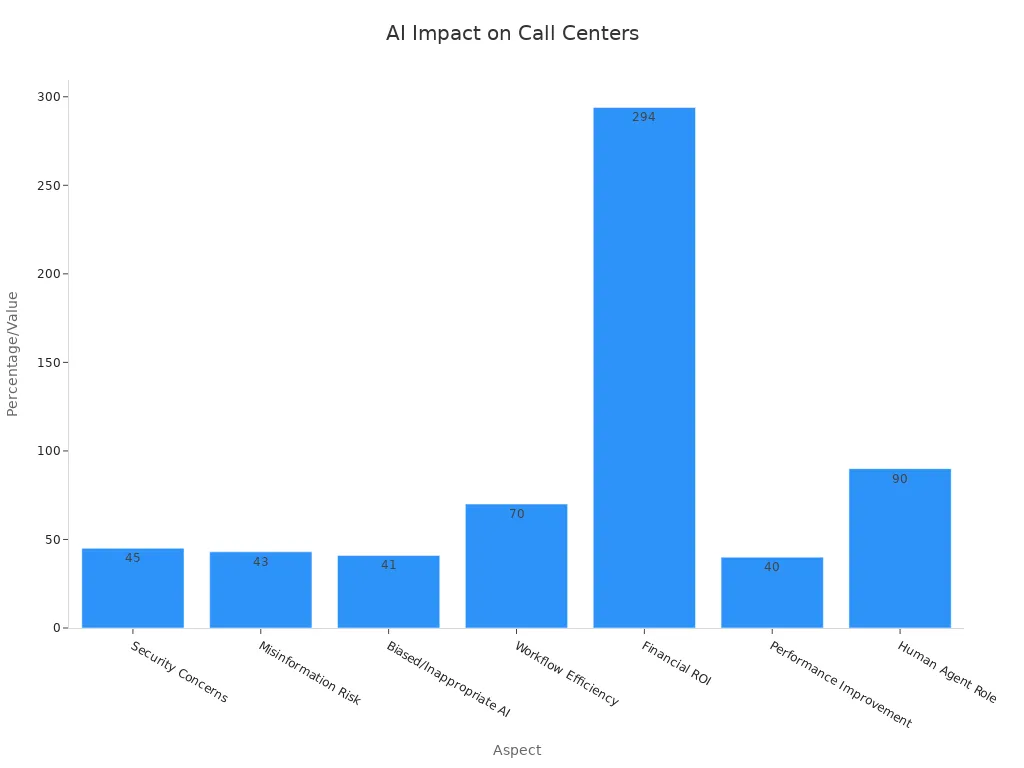Call Centre Compliance Checklist for 2025 Success

New regulations in 2025 make call center compliance more urgent than ever. Non-compliance can result in fines, such as up to £18 million under the Online Safety Act or $40,000 for each DNC violation. Recent data shows 19% of organizations faced legal actions for compliance failures, while the average breach cost with high non-compliance reached $5.05 million. Call centre compliance builds customer trust and protects business operations. Solutions like Sobot and Sobot AI help organizations stay ahead by securing data and ensuring robust call center compliance.
Call Centre Compliance Overview
What Is Call Center Compliance?
Call center compliance means following all laws, regulations, and industry standards that govern how call centers operate. These rules cover areas like data privacy, customer privacy, telemarketing, and consumer privacy. In 2025, call centre compliance includes strict adherence to frameworks such as GDPR, TCPA, and FCC guidelines. Companies must ensure that every agent, process, and technology meets these compliance rules. The use of automation, AI-driven quality assurance, and advanced reporting tools has become essential. These technologies help call centers monitor calls, coach agents, and embed compliance actions into daily workflows.
| Aspect | Definition / Metric / Statistic |
|---|---|
| Compliance Definition | Strict adherence to all applicable laws, regulations, and industry standards governing call center operations. |
| Compliance Status | Binary: either compliant or non-compliant, no middle ground. |
| Compliance Metrics | Customer Satisfaction (CSAT), Net Promoter Score (NPS), Voice of the Customer programs, Customer Surveys. |
| Financial Penalties Example 1 | $24 million settlement in 2022 for ECOA violations (discriminatory lending practices). |
| Financial Penalties Example 2 | Up to $5,000 per violation under TILA; class action penalties up to $1 million or 1% of net worth. |
| Agent Replacement Cost | Upwards of $10,000 due to compliance failures leading to agent attrition. |
| Compliance Technology | AI-driven quality assurance software automates monitoring, provides real-time violation alerts and analytics. |
Why It Matters in 2025
Call center compliance in 2025 is more than a legal requirement. It is a strategic priority for business continuity and customer trust. New regulations, such as GDPR updates and evolving FCC rules, demand stronger controls over consumer privacy and data handling. Companies face growing threats from cyberattacks, with ransomware making up 22% of incidents. Global cybercrime costs are expected to reach $10.5 billion by 2025 (source). SOC 2 compliance now addresses security, confidentiality, privacy, and availability, which are vital for customer confidence. Sobot’s AI-powered solutions help organizations meet these standards by automating compliance checks and securing sensitive data.
- Ransomware accounts for 22% of cyberattacks.
- SOC 2 compliance covers security, confidentiality, privacy, and availability.
- Automation and AI improve compliance, agent morale, and customer experience.
Key Risks and Penalties
Non-compliance with call center regulations brings severe consequences. Financial penalties can reach millions, such as the Financial Sector Conduct Authority imposing nearly R943 million in fines in 2023/24. The cost of non-compliance averages 2.7 times higher than compliance, with an annual difference of about $9.4 million. Risks include forced shutdowns, lost revenue, and increased insurance costs. Reputational damage can lead to customer loss and reduced sales. Legal actions, such as lawsuits and class actions, highlight the need for strong compliance rules and agent training.

- Financial penalties from TCPA, HIPAA, and PCI DSS can be substantial.
- Operational disruptions may include forced closures or suspension of payment processing.
- Legal actions and reputational harm can severely impact business growth.
2025 Regulatory Compliance Measures

TCPA and Consent Rules
The landscape of tcpa compliance continues to evolve in 2025. The fcc postponed the one-to-one consent rule to January 26, 2026, but call centers must still prepare for stricter consent requirements. The telephone consumer protection act now requires prior express written consent for each seller, not just for general marketing. This means every call center must collect and store seller-specific consent, making recordkeeping more important than ever. The fcc also reduced the opt-out processing window to 10 business days, down from 30. Tcpa compliance now covers AI-generated voice calls and text messages, with fines reaching $1,500 per violation. Sobot’s Voice/Call Center platform helps organizations track consent, manage opt-in and opt-out requests, and maintain detailed records to meet these new fcc regulations.
| Numerical Data Point | Description |
|---|---|
| 9.4% | Increase in TCPA-related litigation in 2023 |
| 10 business days | New opt-out processing window (from April 11, 2025) |
| $1,500 | Maximum fine per TCPA violation |
| 7 | Required uses of prior express written consent in 2025 |
Data Security and Privacy Laws
Data security and privacy laws in 2025 demand robust tcpa compliance and adherence to both gdpr and general data protection regulation standards. New rules restrict foreign sales of personal data and increase scrutiny of data brokers. States like Washington and Connecticut enforce strict health and biometric data privacy laws. Companies must update recordkeeping requirements and monitor privacy litigation trends. Sobot’s secure cloud infrastructure and encrypted data transfer support call center compliance with these evolving laws, helping organizations protect consumer privacy and avoid costly breaches.
- New privacy laws target data brokers and biometric data.
- Health data privacy enforcement is rising in several states.
- Privacy litigation related to website data collection is increasing.
AI and Automation Regulations
AI and automation regulations shape tcpa compliance in 2025. The fcc now applies tcpa rules to AI-generated voice calls, requiring prior express written consent for each interaction. Security concerns remain high, with 45% of contact center leaders worried about AI risks. AI-driven automation can improve workflow efficiency by up to 70%, but organizations must monitor for bias and misinformation. Sobot’s AI-powered Voicebot and real-time monitoring tools help call centers meet regulatory compliance measures, ensuring ethical AI use and accurate recordkeeping.

State and Federal Updates
Federal and state regulations continue to impact call center compliance. The fcc enforces call timing restrictions, allowing telemarketing only between 8 a.m. and 9 p.m. local time. The telemarketing sales rule sets fines up to $43,280 per violation. The fcc now extends do-not-call protections to text messages and requires honoring opt-out and revocation requests within 10 business days. States like Oklahoma and Florida have their own telemarketing laws, adding another layer of tcpa compliance. Sobot’s Voice/Call Center platform supports compliance with these new fcc regulations, telemarketing sales rule requirements, and recordkeeping needs, helping organizations avoid penalties and maintain consumer trust.
| Aspect | Details |
|---|---|
| 2025 Regulatory Updates | TCPA redefinition of autodialers, proactive AI-enabled compliance, integration with performance management, increased focus on data privacy and consent |
| Statistical Trends | 92% of agents have QA programs; AI-driven platforms used for real-time risk detection and coaching |
| Top 12 Call Center Compliance Regulations | HIPAA, TCPA, PCI DSS, TSR, DNC Registry, FDCPA, Call Recording Consent, Dodd-Frank Act, GLBA, ECOA, TILA, Internal Guidelines |
| Compliance Software Trends | Shift to AI-powered actionable insights, automated QA, unified data monitoring |
| Consequences of Non-Compliance | Fines up to $225 million, legal risks, loss of consumer trust |
| Best Practices | Use AI-powered compliance software, unify data, proactive risk detection, compliance-driven coaching |
Tip: Regularly review updates to federal and state regulations and update your call center compliance policies to reflect new fcc regulations and consent requirements.
Call Center Compliance Checklist
Policy and Documentation
Effective call center compliance starts with strong policies and clear documentation. Every organization should identify all regulations that apply to its operations, such as TCPA, GDPR, PCI DSS, and HIPAA. These policies must outline how agents handle customer data, manage opt-in and opt-out requests, and follow contact compliance rules. Companies should update their compliance policy regularly to reflect new 2025 requirements.

A well-documented compliance policy helps agents understand their responsibilities and reduces the risk of violations. For example, Sobot’s Voice/Call Center platform allows managers to store and update policies in a unified workspace, making it easy for agents to access the latest guidelines. Regular audits and documentation reviews ensure that policies remain effective and up to date.
Note: Fines for non-compliance with TCPA and DNC regulations can reach $43,792 per violation. About 70% of call centers report compliance challenges, highlighting the need for robust policies and documentation.
Consent and Recordkeeping
Consent management is a core part of tcpa compliance and contact compliance. In 2025, call centers must collect and store seller-specific consent for every customer interaction. This includes tracking opt-in and opt-out requests and honoring revocation of consent within the required time frame. Proper recordkeeping ensures that organizations can prove compliance during audits or investigations.
Sobot’s Voice/Call Center tools help automate consent tracking and recordkeeping. The system logs every opt-in and opt-out action, making it easy to retrieve records when needed. This approach supports compliance policy enforcement and reduces manual errors.
Tip: Always obtain explicit consent before recording calls or sending marketing messages. Use technology to automate opt-in and opt-out processes for better accuracy.
Staff Training
Continuous staff training is essential for maintaining call center compliance. Agents must understand all relevant policies, including how to handle opt-out requests and follow tcpa compliance rules. Training should cover new regulations, data protection, and customer privacy.
Many companies use eLearning and mobile learning platforms to deliver training. In fact, 90% of organizations now use eLearning for call center training, up from just 4% in 1995. Regular retraining helps agents stay current with compliance policy changes and improves contact compliance across the team. Sobot’s unified workspace supports training by providing easy access to updated policies and compliance resources.
- 70% of Fortune 1000 companies say a lack of skilled employees limits growth.
- Ongoing training ensures agents meet call center compliance metrics and business goals.
Technology and Monitoring
Advanced technology plays a key role in contact compliance and tcpa compliance. Real-time monitoring tools, like those in Sobot’s Voice/Call Center, track agent performance and flag potential compliance issues. These systems use AI to analyze calls for script adherence, opt-out handling, and regulatory violations.
Supervisors receive instant alerts for possible breaches, allowing quick corrective action. Real-time data on call volume, wait times, and opt-out rates helps optimize staffing and maintain compliance policy standards. AI-driven compliance scoring converts call data into actionable insights, supporting continuous improvement in call center compliance metrics.
| Monitoring Feature | Benefit |
|---|---|
| Real-time call monitoring | Immediate detection of compliance issues |
| AI compliance scoring | Data-driven feedback for agents |
| Sentiment analysis | Improved customer-agent interactions |
| Automated alerts | Faster response to violations |
Sobot’s technology enables organizations to automate compliance checks, reduce manual effort, and improve overall contact compliance.
Customer Story: Opay
Opay, a leading financial service platform, faced challenges managing high volumes of customer interactions and compliance requirements. By implementing Sobot’s omnichannel solution, Opay unified its customer service across voice, email, and social media. The platform automated consent tracking, streamlined opt-in and opt-out management, and provided real-time monitoring. As a result, Opay increased customer satisfaction from 60% to 90%, reduced costs by 20%, and improved conversion rates by 17%. This success highlights the value of a comprehensive compliance policy and advanced technology in achieving call center compliance.
Trends in Call Centre Compliance

AI-Driven Solutions
AI-driven solutions are transforming call center compliance in 2025. Companies now use AI to automate quality management and compliance monitoring. These tools reduce human error and provide real-time risk assessment. For example, a 100-agent center using AI-powered quality management saved $180,000 from a $70,800 investment, achieving a 154% ROI. AI identifies compliance issues early, supports targeted training, and generates actionable insights. Sobot’s AI platform offers omnichannel support, helping retail and e-commerce businesses unify customer interactions and maintain compliance. By automating compliance checks, companies improve regulatory adherence and protect consumer experience.
- AI reduces manual effort and speeds up compliance checks.
- Early detection of issues helps avoid fines and maintain trust.
- Automated insights support ongoing agent training.
Real-Time Monitoring
Real-time monitoring has become essential for compliance and performance. Supervisors can now listen to live calls, provide instant feedback, and support agents through instant messaging. Real-time analytics track key metrics such as call duration, script adherence, and customer satisfaction. These features help resolve issues quickly and improve agent performance. Sobot’s Voice/Call Center platform delivers real-time dashboards and automated alerts, ensuring agents follow compliance rules and deliver a positive consumer experience.
| Metric | Description |
|---|---|
| First Call Resolution (FCR) | Measures how often issues are solved on the first call. |
| Average Handle Time (AHT) | Tracks the average time spent on each call. |
| Customer Satisfaction (CSAT) | Reflects how happy customers are with the service. |
| Agent Productivity | Shows how much time agents spend helping customers. |
| Call Quality Scores | Rates calls based on professionalism and compliance. |
| Escalation Rate | Tracks how often calls need supervisor help. |
Accessibility and Inclusion
Accessibility and inclusion are now key trends in call center compliance. New regulations require companies to make services available to everyone, including people with disabilities. Sobot’s omnichannel solutions support multiple languages and channels, making it easier for all customers to get help. Features like speech recognition and text-to-speech ensure that everyone can interact with support teams. By focusing on accessibility, companies not only meet legal requirements but also improve the overall consumer experience for a wider audience.
Note: Inclusive design and accessible technology help businesses reach more customers and build stronger trust.
Best Practices for Regulatory Compliance
Continuous Training
Continuous training stands as a cornerstone of call center compliance best practices. Leading organizations provide regular agent training and coaching focused on compliance and customer service. They use a mix of e-learning, simulations, and shadowing to improve knowledge retention. Regular refresher sessions help agents stay updated on new regulations and compliance policy changes. Maintaining detailed training records supports regulatory audits and demonstrates a commitment to compliance best practices. Companies that invest in ongoing training see higher agent readiness and fewer compliance violations. Engaging agents in the quality process fosters ownership and continuous improvement, which builds a strong compliance culture.
Leveraging Sobot Solutions
Sobot’s Voice/Call Center and AI solutions empower organizations to meet call center compliance requirements efficiently. The platform offers real-time monitoring, call recording, and AI-powered analysis to detect compliance issues early. Supervisors can deliver instant feedback and use scorecards with predefined criteria for consistent agent evaluation. Sobot’s unified workspace centralizes compliance documentation, making it easy for agents to access the latest guidelines. Automated consent tracking and recordkeeping reduce manual errors and support regulatory audits. By integrating Sobot’s technology, businesses can streamline operations, improve compliance adherence, and protect customer trust.
Tip: Sobot’s AI-driven tools help organizations monitor multiple communication channels, ensuring holistic call center compliance across voice, chat, and social media.
Proactive Audits
Proactive audits form a vital part of call center compliance best practices. Organizations conduct regular, comprehensive compliance audits—often quarterly—with more frequent spot-checks in high-risk areas. Detailed audit protocols specify the scope, documentation, and corrective actions. Embedding compliance metrics into performance goals reinforces accountability at every level. AI-powered auditing tools, like those from Sobot, enable real-time analysis and immediate feedback, reducing human error and improving audit accuracy. Comprehensive KPI tracking, including customer satisfaction and Net Promoter Scores, demonstrates the impact of audits on customer experience. Proactive audits help organizations identify and resolve issues early, saving time and reducing costs.
Building a compliance culture and adapting to regulatory changes are essential best practices for compliance. Proactive strategies reduce risks, avoid penalties, and strengthen brand reputation.
Proactive call center compliance in 2025 protects businesses from costly penalties and builds customer trust. Companies that follow a clear checklist see real results:
- Royal Bolton averted nine safety incidents in one month after checklist adoption.
- Compliance rates improved from 60% to 97% in several studies.
- Digital checklists in industries like construction and chemical processing reduced accidents and improved audit scores.
Sobot’s all-in-one platform helps organizations automate call center compliance, track consent, and monitor performance in real time. Staying updated on regulations and using advanced tools like Sobot ensures lasting success.
For more guidance on call center compliance, consult Sobot’s experts or visit sobot.io.
FAQ
What are the most important call center compliance rules for 2025?
Call centers must follow the telephone consumer protection act, gdpr, and new fcc regulations. These rules require clear consent requirements, strict recordkeeping, and updated compliance policy. Companies must also meet federal and state regulations, including the telemarketing sales rule and general data protection regulation.
How can Sobot help with recordkeeping requirements and consent management?
Sobot’s Voice/Call Center platform automates recordkeeping and manages opt-in and opt-out processes. The system tracks prior express written consent and stores compliance documentation. This helps organizations meet regulatory compliance measures and pass audits with ease.
Why is continuous staff training a compliance best practice?
Continuous training ensures agents understand compliance rules and policies. Companies that invest in regular training see fewer violations and better call center compliance metrics. For example, 90% of organizations use eLearning to keep staff updated on consumer privacy and contact compliance.
What are the penalties for failing to meet tcpa compliance or new fcc regulations?
Penalties can reach $1,500 per violation under the telephone consumer protection act. The telemarketing sales rule sets fines up to $43,280 per violation. Non-compliance may also lead to lawsuits, reputational harm, and loss of consumer trust.
How do companies ensure accessibility and inclusion in call center compliance?
Companies use technology like Sobot’s omnichannel solutions to support multiple languages and channels. Features such as speech recognition and text-to-speech improve consumer experience and help meet compliance best practices for accessibility.
See Also
Effective Strategies For Managing Quality In Call Centers
Comprehensive Overview Of Quality Management Systems In Call Centers
Essential Software Tools For Quality Assurance In Call Centers
Best Contact Center Technologies Evaluated For The Year 2024
Step-By-Step Approach To Deploy Omnichannel Contact Center Systems
